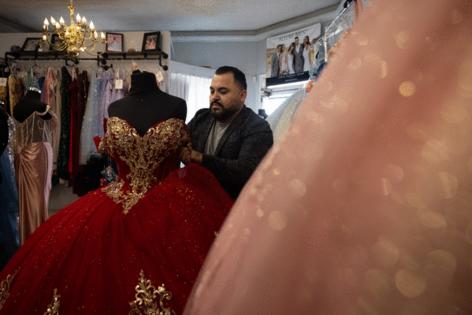Postponed parties, smaller gatherings: Immigration enforcement is changing how San Diego families celebrate
Published in News & Features
SAN DIEGO — Rosa Martinez isn’t sure what Thanksgiving will look like without her husband, seven months after he was deported.
Typically, about 30 members of their family would gather at their home in Brawley in the Imperial Valley, coming in from Merced and San Diego to celebrate.
But now, with her husband of 15 years stuck in Mexicali, she’s been left to support their two young sons and her mother. And there’s confusion in their extended family about what to do for the holiday — her husband was key to bringing them together. Ultimately, only about 10 people will be around her table this year.
“We’re trying to do Thanksgiving, but it’s completely different,” Martinez said. “My husband was the joy of the holidays.”
These months of heartache only add to the anxiety her family had already felt for months before her husband’s deportation. Already they had stopped traveling to visit relatives, avoided going to amusement parks and even feared going outside in their yard — they had seen unfamiliar cars with tinted windows parked outside.
Martinez is a U.S. citizen, but she still worries about agents outside their house.
“Everybody feels like they’re being torn apart,” she said.
Since President Donald Trump began his immigration crackdown, families like Martinez’s have had to restructure their social lives and rethink how they gather for family celebrations — from Thanksgiving dinner to weddings and quinceañeras — due not only to loved ones’ deportations but also to fears of federal enforcement.
Across the country this year, concerns about arrests have prompted cancellations of cultural festivals and holiday gatherings. In September, Mexican Independence Day celebrations in San Diego were scaled back due to worries that some people, especially undocumented immigrants, might fear attending such an event.
The apprehension is broadly felt. One recent national survey found half of all immigrants in the U.S. — regardless of immigration status — feel less safe and more worried they or a family member could be deported since Trump took office. Last month, his administration said it had deported half a million people.
Community leaders in San Diego County’s immigrant communities have seen firsthand how such fears have changed people’s social lives.
Martinez’s sister Violet, a community organizer in El Cajon, says she’s spoken with parents who are nervous about dropping their kids off at school and delivers groceries to about 40 families who are afraid to go to the store.
Clariza Marin, a community organizer in southeastern San Diego, has heard similar worries, and says rising costs of living have also led people to cancel or postpone. “Economic strains have only worsened that, but ... people are on pins and needles,” Marin said.
The impact has been particularly stark for owners of small businesses that serve San Diego’s immigrant communities, like dress shops and banquet halls.
Event planner Adriana Romero says one of her clients recently opted for a smaller, at-home quinceañera instead of a larger event at a banquet hall because the father was undocumented. An at-home celebration often costs a family about $10,000 overall, Romero said; a larger event can cost more than twice that.
Osmar Naranjo, who owns the Chula Vista dress shop Cynderella Brides, usually sells 16 dresses a month, nearly all of them for quinceañeras. This year, that number has been cut in half. With sales so sharply down, he’s had to lay off two of his four employees, and he’s keeping inventory low since he isn’t making enough money to restock.
His customers have scaled down their parties or moved them to more intimate locations to keep their families safer. Some are having to reevaluate their financial priorities after a family member is deported, he adds.
“Their money is also being used elsewhere,” he said. “Instead of investing money to have a party, (they) have to help family members that are going through a rough time.”
Naranjo hopes his annual Black Friday sale will bring back some much-needed business. His mother first opened the original shop in Tijuana more than 35 years ago, when he was 5 — it still has a location there — and the Chula Vista location five years later. He learned to sew from her seamstresses.
“It becomes very personal. If I close everything ... It’s like I failed,” he said. “I don’t want this family legacy to let go.”
Jorge Torres owns the Vogue on Broadway, a nearby Chula Vista venue that hosts weddings, quinceañeras and other events. Historically, its customers have been mostly Latino, and more than two-thirds of its events have been quinceañeras — but it’s hosting fewer this year, he says.
Potential clients ask him about his venue’s procedures if immigration enforcement shows up at an event and about cancellation policies should guests be too scared to come. When someone does cancel, Torres returns some of their payment.
It’s already been a tough few years for the business, he says, between the COVID-19 pandemic and inflation. But he’s caught between his business sense and his compassion toward the people fearing for their families’ futures.
“It’s very hard to keep money when you see a family being ripped apart,” Torres says. “The only thing they have is whatever they can take back.”
_____
©2025 The San Diego Union-Tribune. Visit sandiegouniontribune.com. Distributed by Tribune Content Agency, LLC.







Comments